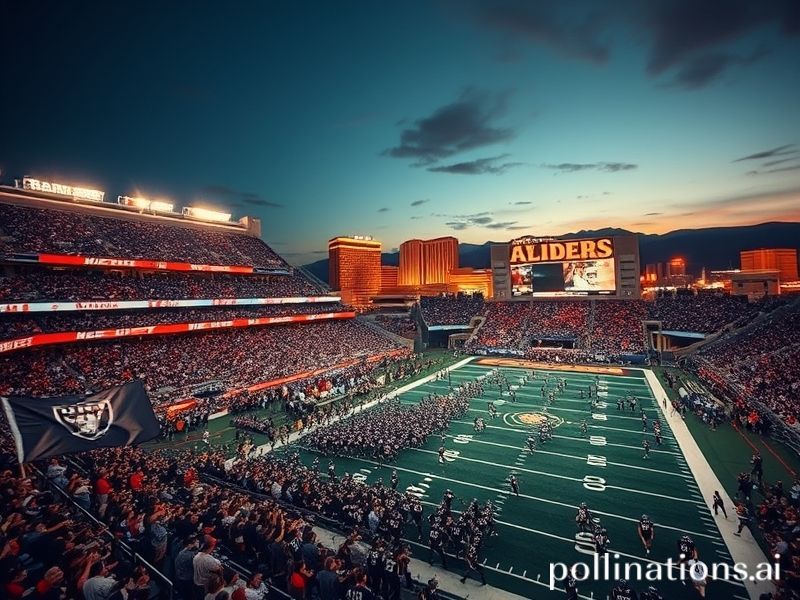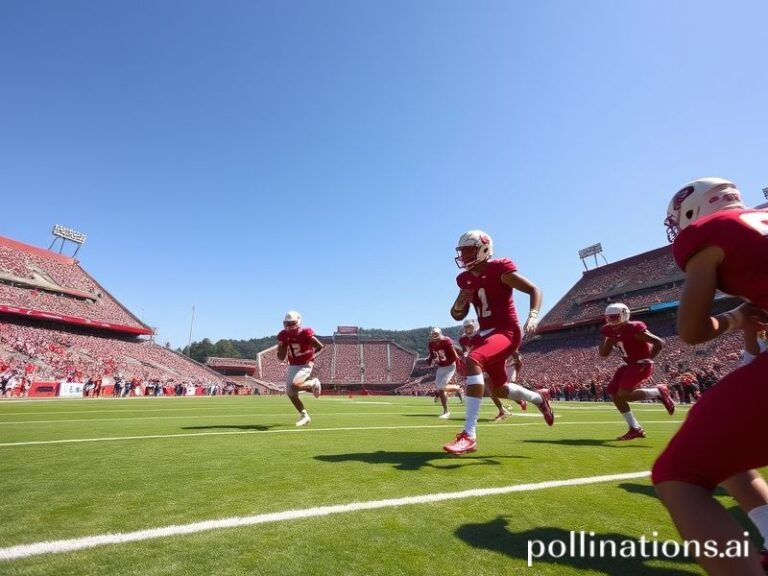Global Gladiators: How Today’s Raiders Game Became a Worldwide Tax-Deductible Circus
Raiders Game Today: A Global Theater Where Gladiators Wear Visors and Sponsors Wear Smiles
By Dave’s Locker International Desk
Alameda County may think it owns the Raiders, but the truth is far less romantic. Somewhere between a drone shot of the Vegas Strip and a freight container in Mundra Port, today’s Raiders game has become the world’s most expensive communal hallucination—part circus, part geopolitical barometer, and, if you squint, a very expensive advertisement for American soft power wrapped in shoulder pads.
From the moment the NFL beams the opening kickoff via satellite to 180-plus countries, the Raiders game ceases to be merely sport. In Lagos, a betting shop owner refreshes his odds faster than the Central Bank devalues the naira. In Reykjavik, a barista toggles between the live feed and a climate protest livestream, wondering which spectacle will age worse. And in Beijing, a factory foreman checks his phone between welding shifts, silently calculating how many iPhones must leave the line to equal Davante Adams’s per-catch bonus. The moral? Capitalism always runs a deeper route than the cornerback covering it.
The Raiders themselves are a traveling metaphor: once the bad boys of Oakland, now the tax-deductible darlings of Nevada, soon, if rumors are true, the reluctant houseguests of whichever city promises the shiniest new stadium and the dimmest audit. Relocation is presented as progress, though it looks suspiciously like a protection racket in shoulder pads. Still, the league markets it as “global expansion,” a phrase that once referred to empires and now describes streaming rights.
Today’s opponent—let’s say the Chiefs, because irony loves a monarchic mascot—adds diplomatic spice. Travis Kelce’s jersey outsells most EU agricultural exports, while Patrick Mahomes’s no-look passes are studied by Chinese data scientists who swear the motion-capture algorithms improve facial-recognition software. Somewhere in Brussels, a bureaucrat drafting AI regulations sighs, realizing the most effective surveillance training ground is, in fact, third-and-long.
Ticket sales, meanwhile, have transcended currency. Luxury suites are priced in bitcoin, yuan, and whatever crypto token a Saudi sovereign fund is pumping this week. The secondary market is run by bots so sophisticated they could probably negotiate a Middle East ceasefire but prefer cornering the market on aisle seats. Average fans, those quaint artifacts of the 20th century, watch from parking lots or pirate streams, their faces lit by the same LED glow that illuminates Singaporean trading floors at 3 a.m. local time.
Halftime entertainment—rumored to feature a K-pop band, a Colombian reggaeton star, and at least one hologram of a dead American rapper—will be simulcast on TikTok, where it will compete for attention against Ukrainian battlefield updates and influencer tear-apology videos. The algorithm doesn’t judge; it merely optimizes despair alongside dance routines.
And then there’s the merchandise calculus. Every stitched “LV” logo on a Raiders cap is a tiny trade imbalance: polyester from China, dye from India, design software from Sweden, and shipping insurance underwritten in London. The finished cap retails for $45 in the team store and $4.50 on a Bangkok street stall, proving that authenticity, like pass interference, is negotiable depending on the referee’s angle.
By the fourth quarter, the scoreboard will tell one story—probably something like 31-28 with a last-minute field goal—but the real ledger is elsewhere. The carbon footprint equals a month of flights between Dubai and Geneva. The gambling apps will process more micro-transactions than the GDP of Montenegro. And in some windowless room, an NFL executive will toast another successful “global footprint” while Googling “How to say ‘personal seat license’ in Mandarin.”
When the final whistle blows, fans will file out convinced they’ve witnessed something tribal and sacred. In reality, they’ve attended a meticulously choreographed expo on late-stage capitalism, padded for comfort and narrated by retired quarterbacks who now sell reverse mortgages. But don’t let the cynicism ruin the nachos. After all, civilization has always needed coliseums; we just upgraded the lions to linebackers and the emperors to tech conglomerates.
And tomorrow, the circus moves on—unless, of course, the Raiders decide another city offers better tax abatements. In which case the world will follow, credit cards in hand, ready to pledge allegiance to whichever zip code promises the most immersive consumer experience. Bread and circuses, dear reader, now come with complimentary Wi-Fi and a side of existential dread. Enjoy the game.







